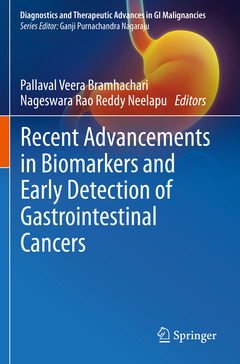Description
Recent Advancements in Biomarkers and Early Detection of Gastrointestinal Cancers, 1st ed. 2020
Diagnostics and Therapeutic Advances in GI Malignancies Series
Language: English
Subjects for Recent Advancements in Biomarkers and Early Detection of...:
Publication date: 07-2021
231 p. · 15.5x23.5 cm · Paperback
Publication date: 07-2020
Support: Print on demand
Description
/li>Contents
/li>Biography
/li>Comment
/li>
This book describes various novel biomarkers for the early diagnosis of gastrointestinal (GI) cancers. It also highlights recent advances in understanding the role of molecular markers and biomarkers, such as volatile biomarkers, serum biomarkers, predictive and prognostic molecular markers for the early detection of GI cancers. Further, it discusses novel biomarkers, including circulating microRNAs, serum microRNA and plasma microRNA in GI cancer.
The book presents breakthrough technologies like ultra-sensitive nano-chips, nanosensors, nanodevices, biosensors, electrochemical biosensors, optical biosensors, DNA biosensors, synthetic biology devices, and 'omics' technologies for the early diagnosis of gastrointestinal cancer. In addition it examines the potential of genome-wide association studies, big data analytics, computation biology, systems biology, and nanotechnology for early diagnostics and therapeutics for gastrointestinal cancer, with a focus on personalized cancertreatment. The book is a valuable source for researchers and clinicians engaged in detection and diagnosis of gastrointestinal cancers.Chapter 1. Potential Role of Biomarkers, Biosensors, Technologies and Computational Methods in Early Detection of Gastrointestinal Cancer.- Chapter 2. Biomarkers as the Promising Tools for Early Detection of Gastrointestinal Cancer.- Chapter 3. Development and Evaluation of Biomarkers for Early Detection of Cancer.- Chapter 4. Prognostic Molecular Markers for Gastrointestitinal cancer.- Chapter 5. Metabolic Markers for Early Detection of Gastrointestinal Cancer.- Chapter 6. Current Status of MicroRNA-based Biomarkers for Gastric Cancer.- Chapter 7. Genetic Susceptibility Markers of Gastrointestinal Cancer.- Chapter 8. Approaches For Early Detection Of Gastrointestinal Cancer.- Chapter 9. Biosensors and its Applications for Early Detection of Gastrointestitinal Cancer.- Chapter 10. Application of Nanotechnology in Early Detection of Gastrointestinal Cancer.- Chapter 11. Genetic Marker Identification for the Detection of Early-Onset Gastrointestitinal Cancer Through Genome Wide Association Studies.- Chapter 12. Big Data Analytics to Discover Diagnostics and Therapeutics for Gastrointestitinal Cancer.- Chapter 13. System Biology Approach for Early Prognosis of Gastrointestinal Cancer.
Dr. Neelapu Nageswara Rao Reddy is currently an Assistant Professor at the Department of Biochemistry and Bioinformatics, Institute of Science, Gandhi Institute of Technology and Management (GITAM) (deemed university), India. He obtained his Master’s in Life Science from Pondicherry Central University, and Ph.D. in Evolutionary Bioinformatics from Andhra University, Visakhapatnam, India. His research interests include bioinformatics, cancer, and fungal biology with specialization in drug target discovery, HLA-based peptide vaccine design, genome analysis, phylogeny




